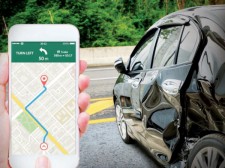
CHICAGO, December 3, 2018 (Newswire.com) - It's bound to happen. Especially for rideshare drivers who are driving more than 30-plus hours a week. They may have tempted fate a few times, escaped a couple of close calls. This time, however, the driver wasn't so lucky. CRASH.
For that reason, it’s vital to understand how to protect a person's interests at the scene of a crash, where the actions and words can literally make or break a lawsuit down the road. LegalRideshare is the only law firm entirely dedicated to rideshare accidents and injuries, and they know a thing or two about how to handle these unfortunate events.
Fault is really a non-issue. It doesn't matter who did what, whether the other driver abruptly braked or if someone took their eyes off the road. The strategy remains the same.
Bryant Greening, Attorney, LegalRideshare
FAULT?
When talking about how to handle an accident, fault is really a non-issue. It doesn’t matter who did what, whether the other driver abruptly braked or if someone took their eyes off the road. The strategy remains the same.
- Call the police to make an accident report
- Be polite but never admit fault or apologize to anyone
- Don’t move the vehicles until told to do so by the police (unless stuck in a dangerous spot on the road)
- Get the names, addresses and telephone numbers of all drivers, passengers and witnesses
- Exchange insurance information with the other driver(s)
- Take pictures of the scene, damage to the vehicles and any markings on the road (i.e., skid marks)
- Don’t exit the car in a dangerous or high-traffic area
IF PASSENGERS ARE INJURED
- Call an ambulance, if necessary
- People should tell the police if they're hurt
- Seek medical treatment immediately (The longer someone waits to see a doctor, the more difficult it will be to prove that the crash caused the injury.)
- Be specific when describing the injury to medical providers, including when the pain started and how the pain feels
- Tell medical providers the exact mechanism of the injury (i.e., “I was involved in a rear-end collision today that caused my head to strike the steering wheel.”)
INSURANCE
On the other hand, people generally don’t want to provide much information to the other driver’s insurer. People can discuss the property damage and let an adjuster inspect their car, but they should not give a statement about how the accident happened, their injuries or their medical treatment. Here, anything said can and will be used against the person later.
Accidents are the last things drivers want to expect while on the road, but this checklist will make sure everyone is prepared if it happens.
Drive safe. Drive smart.
Source: LegalRideshare
Share:
